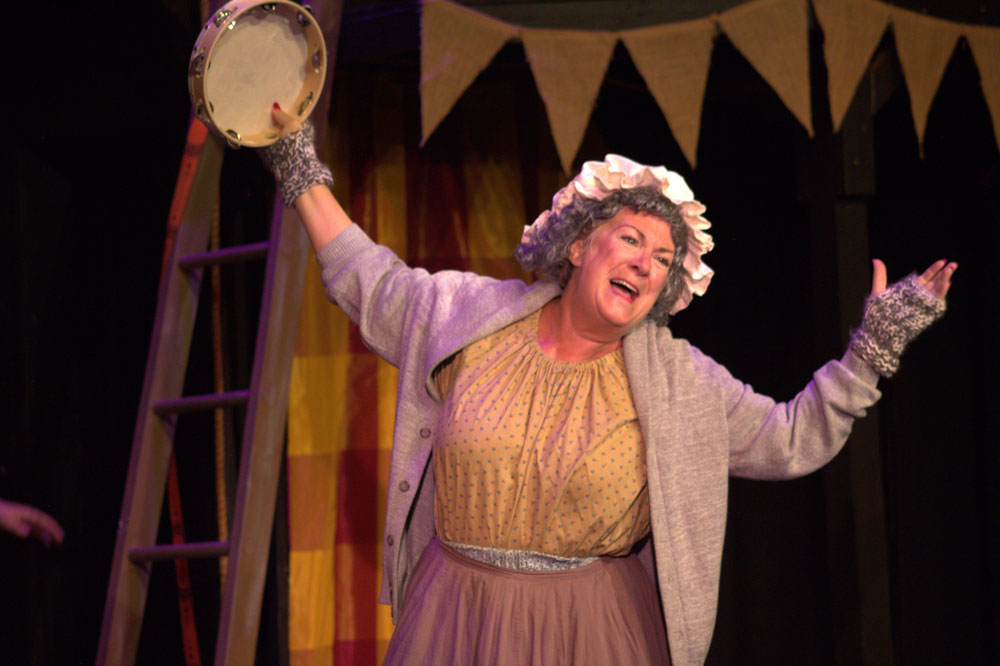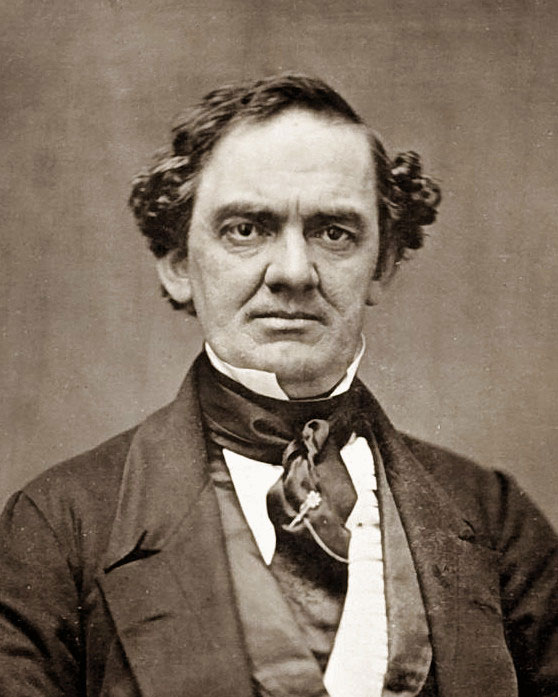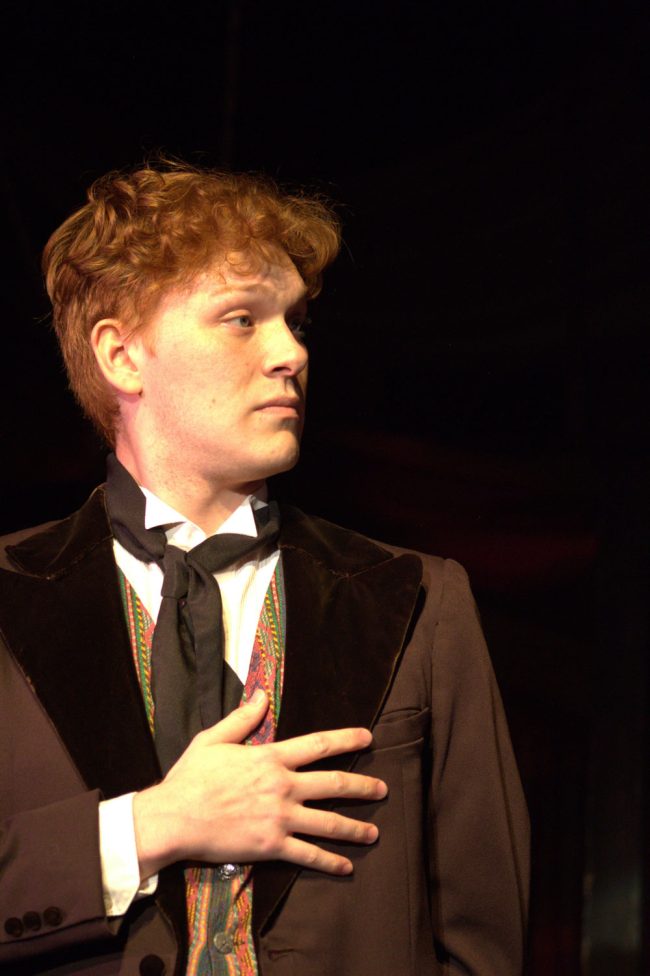
When the Flagler Playhouse opens its production of the musical “Barnum” on Friday (April 21), patrons will be treated to the sight of Jumbo.
“We’ve got this 20-foot elephant, and he dances and everything!” says director Terri Williams.
Austin Kelley, who portrays the title character, the 19th-century showman and circus impresario Phineas Taylor (P.T.) Barnum, and Jamie Irvine, who portrays his wife, Charity, are quick to affirm Williams’s bodacious claim: that a gigantic elephant, portraying the real-life beast that Barnum purchased from the London Zoo and brought to America in 1882, will be prancing and dancing onstage at the playhouse venue in Bunnell during the play’s three-weekend run.
Never mind the mischievous smiles of Williams and her two leads. Never mind that, akin to the hero of the play, that showman (snake oil salesman?) who supposedly proclaimed “There’s a sucker born every minute,” the threesome may be indulging in what Barnum himself called “humbug.” In his 1865 book “Humbugs of the World,” Barnum defined the term as something that “consists in putting on glittering appearances . . . by which to suddenly arrest public attention.”
The Cambridge Dictionary defines “humbug” as “dishonest talk, writing or behavior that is intended to deceive people”–Fox News would eminently qualify, now that it has been certified by a judge as a machinery of lies for audience retention. Wikipedia’s more benign definition says humbug is “a person or object that behaves in a deceptive or dishonest way, often as a hoax or in jest.” Either way, it makes “Barnum” just as eminently timely.
So, Jumbo the Elephant will be dancing at the playhouse?! That’s their story and they’re sticking to it.
“We have Jumbo,” Williams says. “Barnum walks a tight rope. We’ve got our trapeze, We’ve got our aerialists. We have our jugglers. We’ve got it all. I’m probably the only person crazy enough to mount this production.”
“Barnum,” a musical with book by Mark Bramble, lyrics by Michael Stewart and music by Cy Coleman, opened on Broadway in 1980. The play tells the story of Barnum, who lived from 1810 to 1891 and became famous, and notorious, for promoting – and cashing in on – various “curiosities” and spectacles that he charged for the public to see.
In other words, he was the Roger Ailes of circus acts, which may sound a bit redundant. That’s not an original insight: Gabriel Sherman, author of The Loudest Voice in the Room: How the Brilliant, Bombastic Roger Ailes Built Fox News and Divided a Country (2014), described Ailes simply: “He’s like Citizen Kane meets P.T. Barnum.”

Both men knew how to deceive for profit, though Barnum did it less cynically, using other people’s misfortunes or preying on their peculiarities for purely personal gain: hiding the profit motive behind ideological crusades or cheap patriotic pandering was not for him. Not that Barnum could be any less grotesque than Ailes, or Donald Trump.
One such Barnum exhibition was the elderly African-American slave woman Joice Heth, whom Barnum falsely claimed was the 161-year-old nursemaid of George Washington. (In the playhouse production, Heth is portrayed by the white actress Marybeth Leifer.) While Barnum received some condemnation for his exhibition of Heth, more notoriety came following her death in New York City in 1836: Knowing people were intrigued by the alleged super-elderly woman, Barnum arranged for a public autopsy, which was performed before 1,500 spectators who paid 50 cents each (equivalent to $12.34 in 2021).
The surgeon who performed the autopsy promptly declared the age claim was fraudulent. Only much later did Barnum admit to the hoax.
In 1850, Barnum promoted the American tour of Swedish opera singer Jenny Lind, paying her the then-exorbitant fee of $1,000 a night for 150 nights. Barnum also made a celebrity of Charles Sherwood Stratton, a dwarf who came to be known by his stage name, “General Tom Thumb.”
When in 1841 Barnum opened his Manhattan-based American Museum, a combination zoo, museum, wax museum, theater and what some would call a “freak show,” the showman gleefully exhibited ridiculous hoaxes–to put it kindly–such as the “Fiji mermaid” (a mummified monkey corpse joined to a fish tale), live whales in an aquarium, other exotic animals, Chang and Eng the Siamese twins, Native Americans performing traditional songs and dances, the occasional accurate historic and scientific displays, and more outré presentations. Those were the days before political correctness gave tastelessness second thoughts.
In 1871, Barnum met James Anthony Bailey, and together they founded the Barnum & Bailey Circus, which ran from 1871 to 2017. The show’s famous elephant was belatedly retired in 2016, long after animal rights activists had been complaining.
In subsequent years, Barnum’s bombastic showmanship and trickery led him to become known as the person who coined the phrase “There’s a sucker born every minute,” although historians say the attribution is likely apocryphal. But it spoke to his fraudulence.
Indeed, the musical includes the song “There Is a Sucker Born Ev’ry Minute,” as well as “The Colors of My Life,” “Love Makes Such Fools of Us All,” “Come Follow the Band,” “The Prince of Humbug,” “Join the Circus” and others.
The original Broadway show ran for 854 performances and was followed by a London production, among others. (The 2017 movie “The Greatest Showman,” starring Hugh Jackman as Barnum, is not based on the play and features different music, Irvine notes.)
Given that Barnum seems to be part cynic, part huckster and part con man, one might think that theater-goers wouldn’t find him very likable as the protagonist of a play. But the Mark Bramble book makes him so.
“That’s what’s funny about it — when you look at him just on a piece of paper, he seems pretty horrible,” says Kelley, a St. Augustine resident who works as the production manager at that city’s Limelight Theatre. Kelley estimates he has worked in about 30 productions as director, actor and stagehand over the past seven years at the Limelight, the Flagler Playhouse, Palm Coast’s City Repertory Theatre, in Jacksonville theaters and elsewhere.
“But I remember one thing specifically that Terri mentioned when we started rehearsals,” Kelley says. “She said, ‘I want you to look at Barnum as someone who doesn’t think he is doing anything necessarily wrong. He genuinely thinks he’s making people’s lives better in some capacity, because he thinks that people want to be fooled.’

“That really got me thinking. It started me noticing a bunch of different things when it comes to entertainment nowadays. Anything from television to Broadway to even a private magic show or being a local in St. Augustine — there’s a lot of humbug around there too, a lot of tourist attractions such as Ripley’s Believe It or Not.”
Kelley says he “can see the appeal from that perspective. If you go into that kind of stuff with the mindset of ‘I want to be fooled,’ if you go into a magic show saying ‘I want to be dazzled’ or a horror movie saying ‘I want to be scared,’ that’s the way you make the best of it. I think that was Barnum’s mentality to how he brought entertainment to America.”
So if the staging of the musical this month might feel to some eyes and ears more timely than it otherwise would, what with the revelations of naked hoaxes from one of the nation’s leading entertainment networks posing as news, it’s purely coincidental, if not unintentional. The musical’s heart and mind are decidedly elsewhere, ironically creating a myth–if not a hoax–of their own, turning a scabrous character into a lovable one. But if there’s no such thing as bad publicity, the linkage between a confederacy of hucksters past and present can’t hurt.
The play takes some liberties with Barnum’s real-life story, especially by exaggerating his relationship with the opera singer Jenny Lind. But the cast and crew believe audience members will get a feel for the real Barnum–or at least the author’s version of the real Barnum–however complex his character may be.
“With everything said about Barnum, he does have heart,” says Irvine, a Pittsburgh native who moved to Palm Coast in 2011, and who has been involved in theater since her first show at age 10, followed by her first professional show a year later. “Barnum truly cared about his acts and the people involved in his acts. And he truly loved his wife.”
“Barnum was the ultimate sweet talker,” Williams says. “He could charm anything out of anybody. That was his personal humbug. He wasn’t lying, but he was telling you what you wanted to hear.”
“He was walking live theater,” Irvine says. “He really was. He was able to suspend your disbelief.”
Kelley compares Barnum to the celebrities and social media “influencers” of today, where anyone wanting to become rich and famous seemingly must practice the arts of self-promotion and building one’s “personal brand.”
“Barnum was the original influencer,” Kelley says. “He figured that out long before anyone else could, and now today it’s so ingrained in our society to where anyone who wants to pursue a career of any kind, or if you want something, you have to be able to sell yourself. He was a master of that, and by example he brought that concept into our society.” (Cue Ailes.)
Along with Jumbo the Elephant, part of the light-hearted “humbug” of the playhouse production is simulating a real-life circus.
“The Playhouse is the perfect venue to do this,” Williams says. “I’ve done over 300 performances of ‘Barnum,’ from the high school level to professional, but I’ve never directed it before.”

Williams grew up in Allentown, Penn., where, through her mom’s dance studio, she became involved in theater. She has worked as a performer, choreographer, director, set designer, box office manager and more every year for the past 45 years, she says. She and her late husband Larry Williams ran the Municipal Opera Company (MunOpCo) in Allentown before moving to Palm Coast in 2015, where they became active in the Flagler Playhouse.
“The playhouse is the perfect size, and it’s close to the audience,” Williams says. “When the audience comes in, we’ve got curtains hanging above the doorways so they’ll feel like they are walking into a circus tent.
“This play is a huge undertaking. For these actors, it’s a physically exhausting show. They do all the set changes, which are all choreographed. It’s nonstop. The show was written like a circus: One act comes on, the ringmaster comes out and makes a speech, then we’re into the next thing. So there are no blackouts. It just goes.”
Mention that staging “Barnum” at a community theater seems rather ambitious, and Williams will laugh.
“I have been called that many times during this process,” says Williams, who notes she and Irvine had been contemplating staging the musical ever since they met eight years ago, soon after Williams arrived in town. “I’m a go-big-or-go-home kind of person,” Williams says.
In passing, Williams notes that the playhouse’s April 2019 production of “Best Little Whorehouse in Texas” was the last show directed by her late husband Larry, “and it was probably my last show performing. It was nice to be part of his last production.”
“Barnum,” she adds, will likely be her swan song for the Flagler Playhouse. While Williams currently is the food and beverage manager at Marineland Dolphin Adventure in St. Augustine, she recently launched a new theatrical company, the Green Room Farm to Table Dinner Theatre, and she plans to expand its offerings to a full season in the coming year.
“I really want to go out with a bang, and there is no more spectacle than this show is,” Williams says.
The cast, which features some actors portraying multiple roles, also includes: Zaid Evensen as Tom Thumb; Greg Leifer as Julius Goldschmidt, Amos Scudder and Humbert Morrisey; Lora Thompson as Jenny Lind; Marybeth Leifer as the blues singer; Shawn Moksnes as James Bailey, Chester Lyman and Sherwood Stratton; Peter Gutierrez as the Ringmaster; Brigid Mullen as Mrs. Stratton; Dominick Barbee as Wilton, Edgar Templeton and the Concertmaster; Raquel Schenone as the first woman and Jessica Barrett as the second woman.
![]()
“Barnum,” music by Cy Coleman, book by Mark Bramble, directed by Terri Williams, at the Flagler Playhouse, 7:30 p.m. April 21-22, April 28-29 and May 5-6, and at 2 p.m. April 23, April 30 and May 7. The Flagler Playhouse is at 301 E. Moody Blvd., Bunnell. Tickets: $30 adults, $25 students (ages 21 and younger with a student ID; proof of age and student ID must be presented at the box office upon entry). Tickets are available at flaglerplayhouse.com or by calling the box office at 386-586-0773.





























Doug Brown says
You people are NUTS. Let alone being crazy.
IN YOUR FACE says
Wow, with all the times CNN, MSNBC ABC , ETC we’re caught out right FABRICATING news, so called reporters of integrity like like Dan Rather reporting false information on a presidential candidate right before an election then discovered he is a major financial contributor to the Democratic Party and the NON-INVESTIGATIVE PUFF PIECES CNN & THE REST CONTINUE TO REPORT ON THE BIDENS, CLINTONS AND OBAMAS it really amazing how you Pierre still single out Fox News as a “HUCKSTER”.
Pierre Tristam says
Sure. Compare a murderer of the truth with its jaywalkers. And the Jan. 6 insurrection were just sight-seeing. Ok. Good discussion. Thanks for your brilliance.
Sadly Shaking My Head says
This drivel was embarrassing to read. You manageto politicize the hard work our neighbors, friends, and families invested into a marvelous production. You could have focused on the detailed set design. You didn’t. You could have elaborated on the energetic stage performances. Again, you didn’t. The exceptional musical numbers? Nope. How about the wonderful acting? Crickets… Unfortunately, you chose to appropriate the efforts of others to advance your own political agenda. This publication is as biased as the Fox News you so love to malign (disclosure: I’m not a Fox News fan/follower)